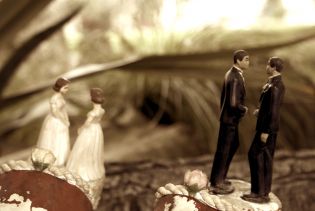Catholic Bishops Caught in Conflict of Interest Over Immigration
June 27, 2017Americans Struggling Under Obamacare Tell VP Pence ‘Real Story’
June 27, 2017
(Wikimedia Commons Photo)
 Today was a good day for religious freedom at the Supreme Court.
Today was a good day for religious freedom at the Supreme Court.
In a 7-2 decision, the court upheld religious liberty by saying that a state cannot exclude a church from a public program just because it’s a church. That was the big case at the court.
In a less-noted move, the court also agreed to review (“granted cert” in the legal jargon) a case about religious liberty, free speech, and government coercion to support gay marriage.
The case involves Jack Phillips, owner of Masterpiece Cakeshop, and whether he must create wedding cakes for same-sex weddings, even if doing so violates his beliefs.
The case goes back to 2012, when a same-sex couple received a marriage license in Massachusetts and asked Phillips to bake a cake for a reception back home in Colorado, a state that in 2006 constitutionally defined marriage as the union of a man and a woman.
Phillips declined to create a wedding cake, citing his faith: “I don’t feel like I should participate in their wedding, and when I do a cake, I feel like I am participating in the ceremony or the event or the celebration that the cake is for,” he said.
The couple later obtained a wedding cake with rainbow-colored filling (illustrating the expressive nature of event cake-baking) from another bakery.
The American Civil Liberties Union filed a complaint against Masterpiece Cakeshop with the state, alleging violations of Colorado’s public accommodation law.
Administrative Law Judge Robert N. Spencer ruled against the bakery on Dec. 6, 2013, concluding that Phillips violated the law by declining service to the couple “because of their sexual orientation.”
Phillips objected to this characterization and responded that he would happily sell the couple his baked goods for any number of occasions, but creating a wedding cake would force him to express something that he does not believe, thereby violating his freedom to run his business in accordance with his faith.
Phillips is right. As Sherif Girgis and I explain in our new book from Oxford University Press, “Debating Religious Liberty and Discrimination,” acting on the belief that marriage is the union of husband and wife does not in itself entail “discriminating” on the basis of sexual orientation.
This overbroad definition of “discrimination” is part of what creates the problems for the free exercise of religion and free speech. And here a pattern holds: Legally coercing professionals serves no serious need, but works serious harms.
Conservative wedding providers are few and dwindling due to market pressures—and most important, they don’t refuse to serve LGBT patrons.
In case after case, bakers have had no problem designing cakes for gay customers for every other occasion. It’s just that an exceedingly small number can’t in good conscience use their talents to help celebrate same-sex weddings by baking a cake topped with two grooms or two brides—or, as in this case, with rainbow filling.
Coercing these cultural dissidents has vanishingly small effects on the supply of products for any given couple, but it impinges seriously on particular vendors’ freedoms of speech, conscience, and religion.
If any harm remains in leaving these wedding professionals free, it is only the tension we all face in living with people who disagree with us on the most personal matters.
As Girgis and I explain in our new book, America is in a time of transition. The Supreme Court has redefined marriage, and beliefs about human sexuality are changing.
Now, the Supreme Court has the chance to protect the right to dissent and the civil liberties of those who speak and act in accord with what Americans had always previously believed about marriage—that it is the union of husband and wife.
Such a ruling would help achieve civil peace amid disagreement. It would protect pluralism and the rights of all Americans, regardless of what faith they may practice.
Ryan T. Anderson, Ph.D., is the William E. Simon Senior Research Fellow in American Principles and Public Policy at The Heritage Foundation, where he researches and writes about marriage, bioethics, religious liberty and political philosophy. Anderson is the author of several books and his research has been cited by two U.S. Supreme Court justices in two separate cases.
Editor’s Note: This piece was originally published by The Daily Signal.





 Today was a good day for religious freedom at the Supreme Court.
Today was a good day for religious freedom at the Supreme Court.